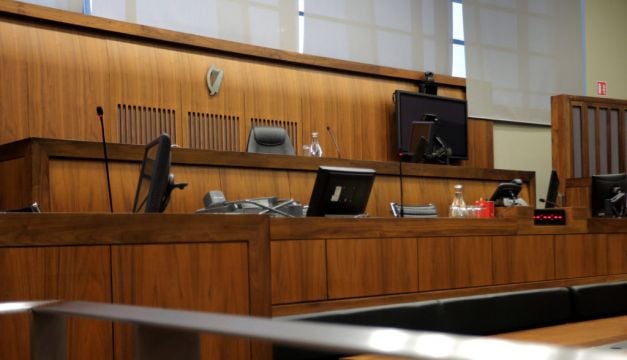The State has argued that a sentence handed down to a 27-year-old man who sexually assaulted his estranged wife after he was recorded on camera saying: “I’m your husband and I have every right to touch you”, was too lenient and should be increased.
The man, who cannot be named to protect the identity of his former wife and their child, received a five-year prison sentence with the final 20 months suspended.
In passing sentence, trial judge Ms Justice Karen O'Connor said the incident had been a frightening and menacing ordeal for the victim who was attacked in her own home where she “had a right to feel safe”.
The woman's distressed 999 call following the attack was played to the three judge Court of Appeal on Monday, along with two videos the woman recorded on her phone prior to the incident.
In the videos, which lasted for a number of minutes, the woman can be heard repeatedly pleading with the man to leave the house.
“Please leave the house, I’m begging you, please leave,” she states.
The man can be heard replying: “I'm not taking this crap. Until it's over, I'm your husband and I have every right to touch you.” The video recordings ended when the man lunged at the woman.
The man pleaded guilty to the aggravated sexual assault of his estranged wife at her home in Co Kildare on November 19th, 2020. Two other counts of sexual assault were taken into consideration.
At the Court of Appeal on Monday, Maurice Coffey SC, for the Director of Public Prosecutions (DPP), argued the five-year sentence with the final 20 months suspended was unduly lenient, having regard to the headline sentence of seven and a half years set by the trial judge.
Aggravating factors
Outlining the aggravating factors in the case, Mr Coffey said there had been violence involved, there was a breach of trust whereby the respondent was estranged from his wife and came to the house on the pretence of something else.
He said the man remained at the property despite lengthy pleas for him to leave the house.
Mr Justice Patrick McCarthy said in submissions that Mr Coffey had contended the headline sentence was too low. However, the judge said he found it “hard to see where there was an error” in the headline sentence.
Mr Coffey said it was a matter of looking at how the entire sentence was structured, with the starting point, a period suspended, and the amount of time for which it was suspended.
Mr Justice George Birmingham said in terms of the mitigating factors, it was hard to see any error in giving a third for the mitigating factors in the case, including the early plea and the respondent’s behaviour post incident when he stayed at the scene and was co-operative with gardaí.
Mr Coffey said emphasis had been given to the “mitigating factors rather than the aggravating factors” in the case.
He said there was also an over-emphasis put on the neuropsychologist’s report, which stated the respondent was of low risk, particularly given the fact that he had not been engaging with his own medical practitioners.
Mr Justice Birmingham said the trial judge clearly paid a great deal of attention to “getting the balance” right.
Mr Coffey said the consideration given to the mitigating factors outweighed that given to the aggravating circumstances.
However, Mr John Edwards said simply because the offence was serious, did not mean the respondent was entitled to less credit for the very serious mitigating factors. “You are entitled to what you are entitled to,” he said.
He said the weight given to the aggravating factors was taken into account in the headline sentence.
Mr Coffey said the reduction from the headline sentence to the sentence imposed, the degree in which that was suspended and the period it was suspended for was “accumulatively too much”.
'Unique set of circumstances'
Roisin Lacey SC, for the respondent, said this case was one with a very unique set of circumstances that were very difficult to balance.
In submissions to the court, counsel said the most significant source of mitigation in the case was the traumatic brain injury suffered by the respondent in December 2017, which had a profound effect on him.
She said the respondent had remained at the scene and the issue in relation to remorse and insight had been dealt with by neuropsychologist Dr Catherine Morton in her report.
Ms Lacey said it was clear from the transcript of the hearing that the trial judge had been incredibly mindful of the impact of the offending and of the aggravating factors in the case.
Mr Justice Birmingham said one matter that did not get a lot of attention was the fact that the respondent had a previous conviction for violence which predates his brain injury.
The court heard this related to an incident of assault causing harm in the context of “a racial slur”.
Counsel said the judge was “certainly aware of it”, adding the necessary focus of the judge was to deal with the matter before her and of crafting a sentence which reflected the offender before her, particularly in terms of the impact of the acquired brain injury he had sustained.
She said Dr Norton’s report had noted it was “highly likely” his brain injury had contributed to the offending behaviour.

The court heard the respondent is due to be released from prison on May 19th.
After rising for a short time, the three judges said they would deliver their judgement in the case on Thursday.
If you have been affected by any of the issues raised in this article, you can contact Women’s Aid (24-hour freephone helpline at 1800-341 900, email helpline@womensaid.ie) or Men’s Aid Ireland (confidential helpline at 01-554 3811, email hello@mensaid.ie) for support and information.
Safe Ireland also outlines a number of local services and helplines at safeireland.ie/get-help/where-to-find-help/. In the case of an emergency, always dial 999/112.







